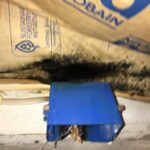 It was just three weeks ago when Mark and I got up and prepared to head to the airport for our speaking trip near Washington DC.
It was just three weeks ago when Mark and I got up and prepared to head to the airport for our speaking trip near Washington DC.
As he does every day, Mark headed downstairs and made his coffee. He spent some quiet time and headed into the kitchen for a second cup of coffee. That’s when he noticed that the electricity had gone out. Further investigation determined it was only out on the wall where the refrigerator and the coffee maker were plugged in.
Hmmmm….interesting.
We have a friend who is an electrician so Mark texted him and asked him to come over and see what he could figure out. We quickly moved all the food from the refrigerator freezer into our deep freeze and headed out the door to the airport.
 What our friend found was horrifying. A bad electrical job by another friend (done 20 years ago when we were renovating the house) down in the ceiling of our cellar (we live in a 108 year old farmhouse) had caused an electric arc in an outlet. It had actually caused a fire and we were only saved by two things: 1) finding the issue quickly, and 2) our flame-retardant insulation. When our friend found the outlet, it was still burning.
What our friend found was horrifying. A bad electrical job by another friend (done 20 years ago when we were renovating the house) down in the ceiling of our cellar (we live in a 108 year old farmhouse) had caused an electric arc in an outlet. It had actually caused a fire and we were only saved by two things: 1) finding the issue quickly, and 2) our flame-retardant insulation. When our friend found the outlet, it was still burning.
Oh my.
That was too close for comfort. Mark and I have talked several times since then about some of the lessons learned in that situation. They’re important for us going forward and we thought you might find them helpful to consider too.
- Never cut costs with electricity. Use a certified electrician for any major electrical projects. Yes it will cost you more but it might just keep you from costing your home. Twenty years ago when we were renovating our home, we had a lot of volunteer help. We didn’t know what we now know about the importance of using a certified electrician. Using quality contractors and skilled labor is very important for Mark’s construction company but he finds folks struggle paying for it. In fact, Mark says they are consistently fixing substandard construction and previous repairs when they launch into a remodel or a home repair project for a customer. You may find someone who comes in with a lower bid on a project or repair, but you also may end up paying the difference in the long-haul when you have to bring someone else in to fix problems that surface. Don’t cut corners on work on your home.
 Be wary of lesser expensive materials. About 10 years ago, we decided to insulate the ceilings of our basement/cellar in an effort to reduce energy loss. The least expensive insulation was not flame retardant. Instead we paid a little more for the flame retardant insulation. That decision was a house-saver in this case. When you’re crunching numbers and the budget is tight it’s easy to want to cut corners. Resist the temptation to cut corners that could affect the safety of your home and family.
Be wary of lesser expensive materials. About 10 years ago, we decided to insulate the ceilings of our basement/cellar in an effort to reduce energy loss. The least expensive insulation was not flame retardant. Instead we paid a little more for the flame retardant insulation. That decision was a house-saver in this case. When you’re crunching numbers and the budget is tight it’s easy to want to cut corners. Resist the temptation to cut corners that could affect the safety of your home and family.- Fix problems earlier rather than later. In this case, the lack of electricity forced us to figure out what was wrong, but sometimes issues don’t present an urgency like that. Still it’s important to maintain your home because a $500 fix now can become a $2000 fix in a year. Mark’s experience says this is especially true with water damage which eats away at wood and causes mold issues, both costly realities to fix.
Our close call was a reminder that in some cases frugal can become fatal if we cut corners on the wrong things. This applies to cars, homes, healthcare, and other places where we hesitate investing our hard-earned money to fix, care for, and maintain the things we use everyday.
May our close call be a reminder for all of us.
What about you? Have you ever had a close call that taught you an important lesson?












My husband is an electrician in the Washington D.C. area and sees this happen quite often, especially in the older homes. Many times they go in after a handyman and have to not only redo what the handyman did but do additional work due to safety issues and to bring the service up to code. This costs the homeowner not only what they paid the handyman, but usually thousands more to correct the problem.
Now if I could only convince my husband he really cannot do plumbing work and hire a plumber before we are without our only bathroom…
LOL…I’m that way when my husband “thinks” he can fix our car!